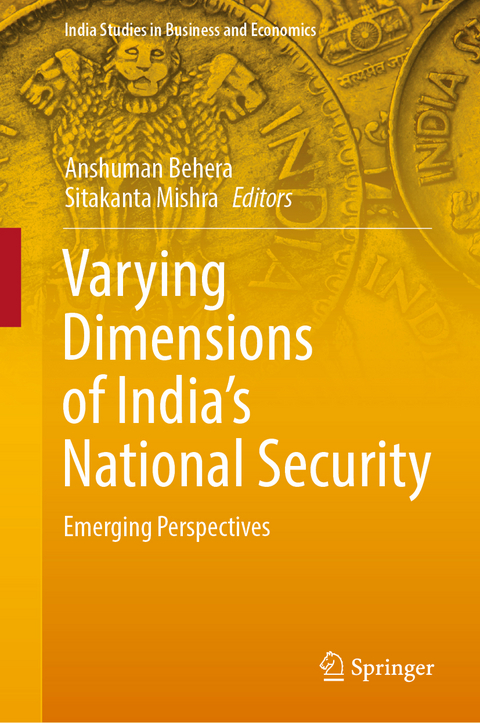
Varying Dimensions of India’s National Security
Springer Verlag, Singapore
978-981-16-7592-8 (ISBN)
Anshuman Behera is Associate Professor in Conflict Resolution and Peace Research Programme at National Institute of Advanced Studies (NIAS), Bengaluru. Prior to joining NIAS, Dr. Behera worked in Institute for Defence Studies and Analyses (IDSA) and Institute for Conflict Management, New Delhi. Dr. Behera earned his Ph.D. from University of Hyderabad. He is Co-Editor of ‘Reasoning Indian Politics: Philosopher Politicians to Politicians Seeking Philosophy’, Routledge, 2018, and Co-Author of ‘Militant Groups in South Asia’, IDSA, 2014. Dr. Behera’s research areas include socio-political conflicts, political violence, political theory, and South Asian Politics. His academic writings have featured in both international and national journals. Apart from his extensive writing on Maoist conflict and religious fundamentalism and terrorism in India, he also writes on political process and change in Nepal, Bangladesh, and Myanmar. Sitakanta Mishra is Associate Professor at School of Liberal Studies (SLS) of Pandit Deendayal Petroleum University (PDPU), Gandhinagar, Gujarat (India). Previously, Dr Mishra was Research Fellow at the Centre for Air Power Studies (CAPS), New Delhi. He was also Visiting Research Scholar at Cooperative Monitoring Centre, USA. He has authored three books, two monographs, many chapters, and research papers related to India’s neighborhood policy, Indo-Pak relations, India’s foreign policy, and nuclear policy and security.
Chapter 1. National Security Discourse: A Critical Engagement.- Chapter 2. India’s National Security Narratives: Challenges and Scopes.- Chapter 3. India’s Quest for Security Through Its Neighbourhood Policy.- Chapter 4. ‘Secrecy as Security Strategy’ in India’s Nuclear Governance.- Chapter 5. India’s Higher Defence Organisation: Recent Reforms and the Way Ahead.- Chapter 6. Emerging Threats of Terrorism to India.- Chapter 7. India’s energy security: Novel assessments, major dilemmas, and potential trade-offs.- Chapter 8. Security threats by Organized Crime-Terror Nexus and Dumping in India and Myanmar: A Case Study of Manipur.- Chapter 9. Geographic Information System (GIS) for National Security.- Chapter 10. National security and the role of media in India.- Chapter 11. India’s Internal Security: Issues, Challenges and Options.- Chapter 12. Competitive, Cooperative and Convergent Maritime Security and India's National Security.- Chapter 13. India’s cyber security landscape.- Chapter 14. Ensuring Economic Security through food security in India: Issues and Challenges.
| Erscheinungsdatum | 18.02.2022 |
|---|---|
| Reihe/Serie | India Studies in Business and Economics |
| Zusatzinfo | 14 Illustrations, color; 12 Illustrations, black and white; XV, 265 p. 26 illus., 14 illus. in color. |
| Verlagsort | Singapore |
| Sprache | englisch |
| Maße | 155 x 235 mm |
| Themenwelt | Sozialwissenschaften ► Politik / Verwaltung ► Europäische / Internationale Politik |
| Sozialwissenschaften ► Politik / Verwaltung ► Vergleichende Politikwissenschaften | |
| Schlagworte | Comprehensive national security • Defence acquisition • drug trafficking • Dumping • Energy Security • GIS • Internal Security • national security • Neighbourhood Policy • nuclear security • Regional Security • terrorism |
| ISBN-10 | 981-16-7592-9 / 9811675929 |
| ISBN-13 | 978-981-16-7592-8 / 9789811675928 |
| Zustand | Neuware |
| Haben Sie eine Frage zum Produkt? |
aus dem Bereich


